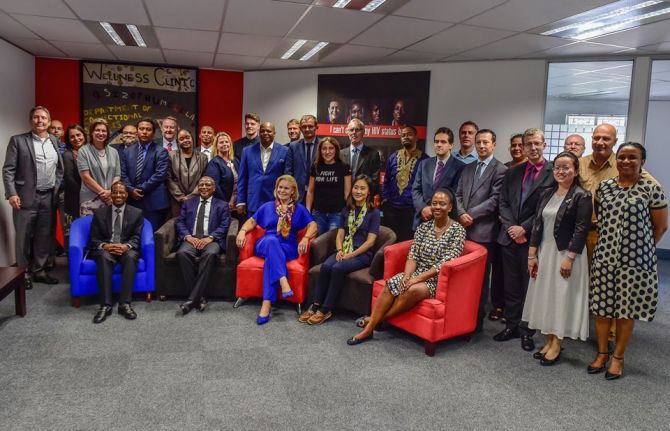

Feature Story
UNAIDS Programme Coordinating Board sees South Africa’s AIDS response first-hand
07 November 2018
07 November 2018 07 November 2018Ahead of its 43rd meeting in December, the UNAIDS Programme Coordinating Board (PCB) conducted a four-day visit to South Africa between 15 and 18 October. During the visit, the delegates met with a wide range of national and development partners working on the AIDS response and conducted a number of site visits in order to experience the support of the Joint Programme to the national AIDS response in a high-burden country.
South Africa has the largest HIV epidemic in the world, with 7.2 million people living with HIV. In the past 10 years, it has made significant progress in its AIDS response, with 4.4 million people living with HIV on treatment. The country also invests heavily, with approximately 75% of the response funded by the government—just over US$ 2 billion in 2017. However, new HIV infections are high, at 270 000 in 2017.
The PCB delegation, led by the UNAIDS Deputy Executive Director, Gunilla Carlsson, and Danny Graymore, from the United Kingdom of Great Britain and Northern Ireland, the Chair of the PCB, comprised seven representatives of Member States, one civil society representative and a number of participants from the Joint Programme.
“The strength of the UNAIDS Programme Coordinating Board is its unique multistakeholder representation, which includes civil society and United Nations cosponsoring organizations, in addition to Member States,” said Mr Graymore. “The United Kingdom has put a particular focus on prevention for 2019. Coming to South Africa, we wanted to see how to get better results on HIV prevention in the context of a conducive environment and a significant investment in the national response.”
During a meeting with the South African National AIDS Council’s (SANAC) civil society forum, Valeria Rachinska, a PCB delegate from civil society, encouraged members of civil society in South Africa to use their voice in the UNAIDS PCB through the two African region representatives.
“The UNAIDS Programme Coordinating Board is unique in that civil society are members and our voice is heard. We can influence the global agenda in this way. I encourage you to get in touch with your African representatives and make your voices heard,” she said in response to concerns about the financing and sustainability of civil society organizations in South Africa.
During the visit, PCB delegates met with other representatives of SANAC, national and local government, civil society and the private sector and visited community-based initiatives in the KwaZulu-Natal and Gauteng Provinces.
“I am delighted to visit South Africa with such a broad and knowledgeable Programme Coordinating Board delegation. It is clear that the support of the Joint Programme is appreciated and important. We need to focus more on HIV prevention and ensure that we reach people being left behind by the AIDS response and find ways to deliver effective prevention services for young women and adolescent girls,” said Ms Carlsson.



